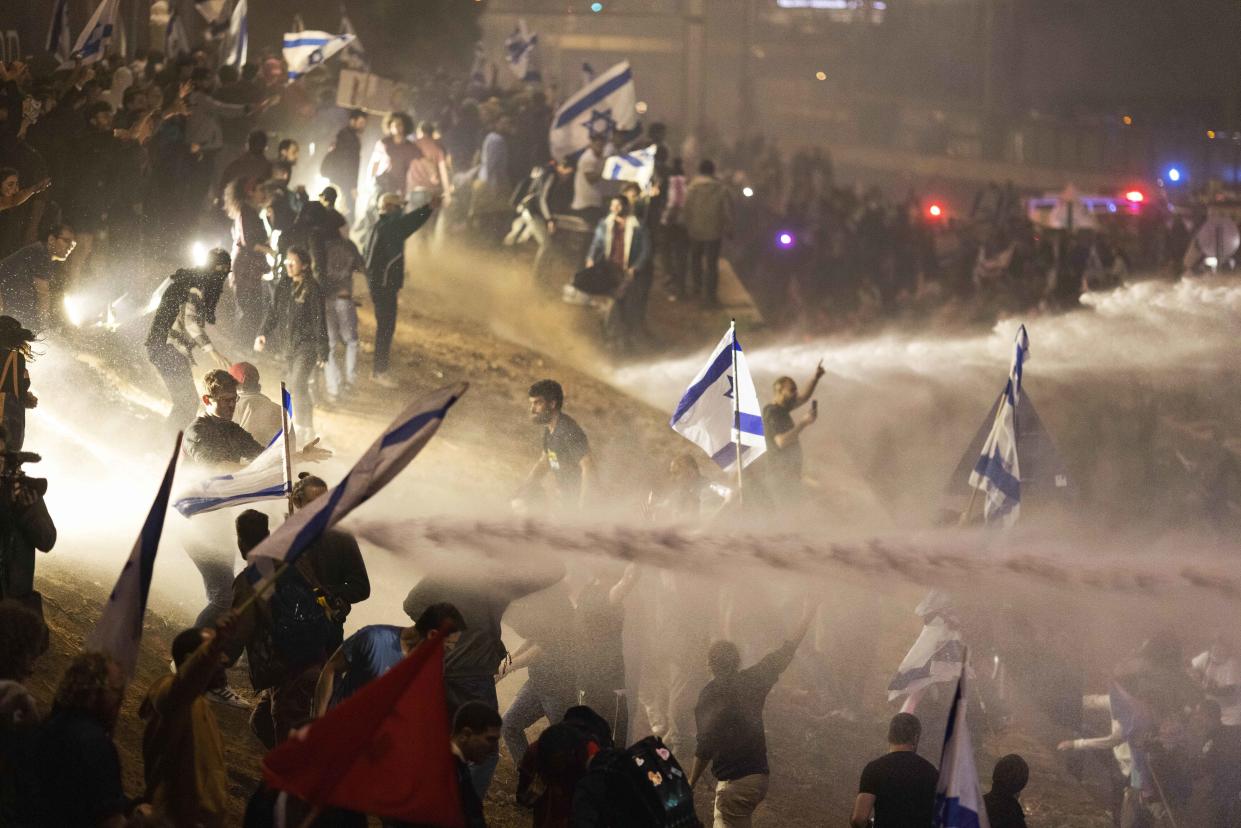Netanyahu agrees to pause judicial overhaul plans following widespread unrest in Israel
JERUSALEM — Prime Minister Benjamin Netanyahu agreed Monday evening to pause a divisive plan to overhaul the country’s judicial system until the next parliament session following widespread unrest in Israel.
In an address, Netanyahu said he was postponing voting on the judicial overhaul to allow time to reach a consensus.
“I will turn every stone in order to find a solution,” he said. “We are in the height of the crisis that is threatening our basic unity.”
But he maintained that the overhaul was still needed.
"A large majority of the public today recognizes the necessity of democratic reform in the judicial system," he said.
The move came after a chaotic day in which Israel was paralyzed as a result of hundreds of thousands of people refusing to work to protest the government’s proposal. The general strike was officially called off following Netanyahu's speech.
The prime minister's change in plans came after Ben-Gvir, the leader of the far-right Jewish Power party who had been a major hurdle to postponing the vote, said he would agree to delaying it.
A National Guard under National Security Minister Itamar Ben-Gvir’s ministry will be established as part of the agreement, the statement from his party said.
"I agreed to remove the veto for the postponement of the legislation, in exchange for Prime Minister Benjamin Netanyahu’s commitment that the legislation will be brought to the Knesset for approval in the next session," the ultranationalist minister said.
Monday's protests followed unrest Sunday night after Netanyahu fired Defense Minister Yoav Gallant, who became the first member of his Likud Party to speak out against the proposed changes. Gallant had warned that divisions over the plans threatened Israel’s security.
"I welcome the decision to stop the legislation in favor of negotiations," Gallant tweeted Monday evening.
The proposal by Netanyahu’s hard-right coalition in January would threaten the independence of the Supreme Court and limit judges’ powers, according to critics. It has faced stiff opposition, with Israelis regularly taking to the streets to demonstrate.
On Monday, Israel’s largest trade union had called for a general strike that halted everything from medical services to flights to meals served by McDonald's restaurants.

Before the judicial overhaul proposal was paused, large crowds of protesters and counter-protesters gathered in the shadow of the Supreme Court in Jerusalem, many waving Israeli flags. Some chanted into megaphones or banged on drums.
Leah Basa, 23, said she felt Netanyahu's plan would lead to the "downfall of democracy."
"I'm protesting the reform which is going to get rid of the checks and balances and get rid of the separation of powers," she said. "I think that it is causing so many rips in society. No matter which side wins, nobody is going to win in the end because whether the reform passes or doesn't both sides just hate each other so much."

Salome Dunaevsky, 57, said she felt Netanyahu's plan would cause chaos.
"It gives total power, almost total power, to the politicians," she said. "It means that there is no rule. You can do whatever."
But the delay of the plan was not welcomed by everyone.
"I feel terrible," Ori Rosenthal, 37, said. "We elected them to do the job and they surrendered to everyone. The minority is terrorizing the majority and that's not democracy."
Israel’s diplomatic staff were among those on strike Monday on the advice of their trade union, one diplomat who was not authorized to brief the media told NBC News. Israel’s embassies in Washington and around the world shut as a result and some diplomats replaced their social media profile pictures with the Israeli flag.
Peter Lerner, the head of international relations at Histadrut, the Israeli trade union umbrella group representing some 700,000 workers, tweeted a video of cheering activists. He said the group’s chairman, Arnon Bar-David, had just told the meeting: “We are stopping the legal revolution.”
In response to Netanyahu's address Monday evening, Bar-David ended the general strike and said he would assist the prime minister in leading negotiations.
"I call on all my friends in the government and in the Knesset, from the left and the right, to put ego aside and see the good of the people and the future of Israeli society before your eyes," he said.
The unrest had affected many sectors. Israel's airport authority confirmed just before 11 a.m. local time (4 a.m. ET) that all departing flights from Ben-Gurion International Airport would be grounded.
Two of Israel’s main seaports, Haifa and Ashdod, said in separate statements seen by Reuters that they would shut down in support of the general strike.
Big brands also took part in the protest: McDonald's said it would begin closing its restaurants across the country from midday (5 a.m. ET) before a full national closure from 2 p.m. (7 a.m. ET).

Israel’s leading universities also closed Monday in protest against both Netanyahu's judicial overhaul plan and Gallant’s firing.
“We, the presidents and rectors of the research universities in Israel, express deep concern about the division and polarization in Israeli society and processes that could lead to a real damage to the national strength and stability of the State of Israel,” they said in a statement. Netanyahu’s planned changes could lead to a “brain drain” in Israel and discourage international students, the statement added.
Israeli President Isaac Herzog was among those who called for the changes to be halted.
“The entire nation is rapt with deep worry. Our security, economy, society — all are under threat,” he said in a statement earlier Monday.
Israel’s consul general in New York, Asaf Zamir, announced Sunday night he would resign after 18 months in the job, over the judicial changes and the defense minister’s firing.
Netanyahu’s planned overhaul also prompted international pressure.
The White House released a statement from the National Security Council on Sunday night that said the most recent protests “further underscore the urgent need for compromise.”
“As the president recently discussed with Prime Minister Netanyahu, democratic values have always been, and must remain, a hallmark of the U.S.-Israel relationship,” it said.
Patrick Smith reported from London, Ali Zelenko reported from Jerusalem and Elizabeth Chuck reported from New York.
